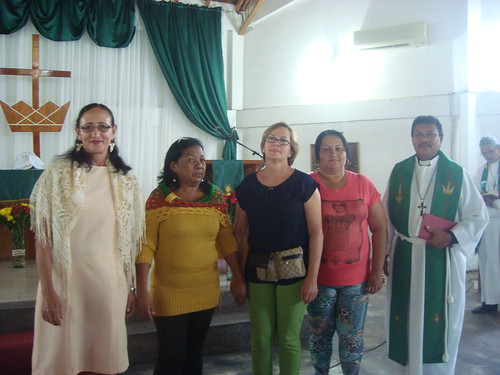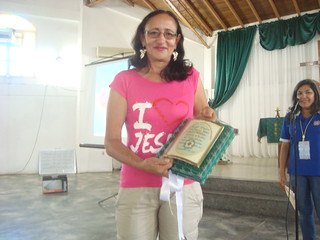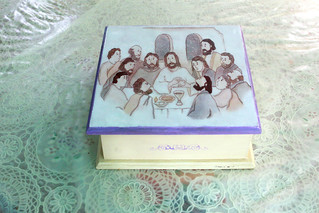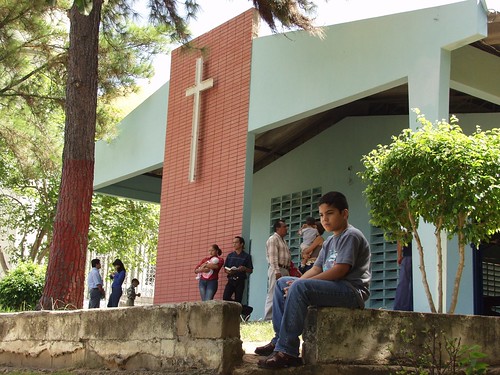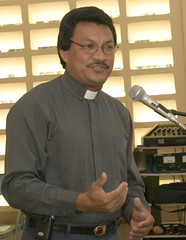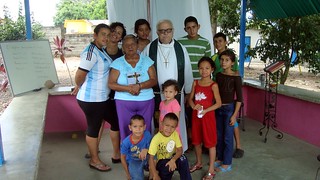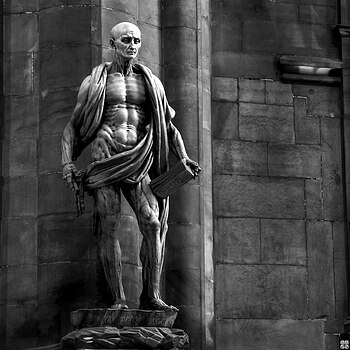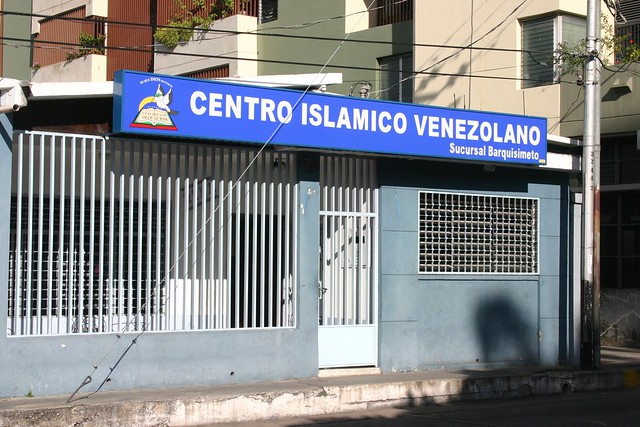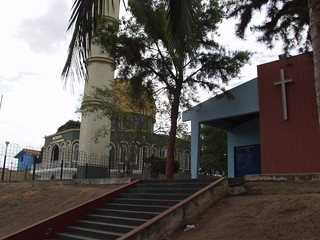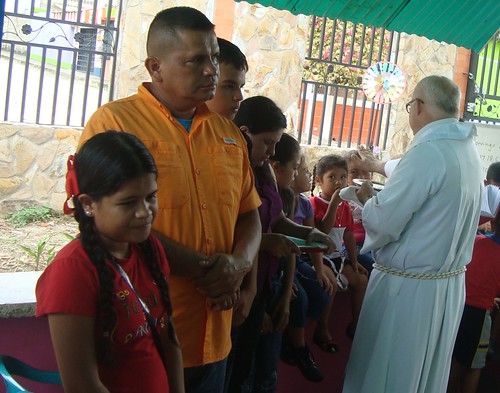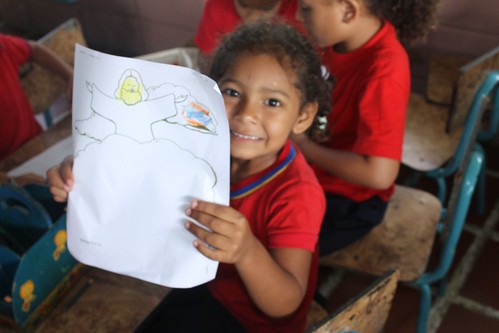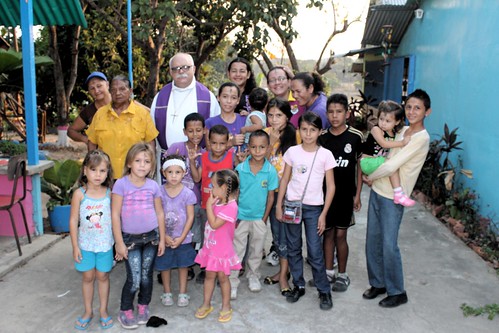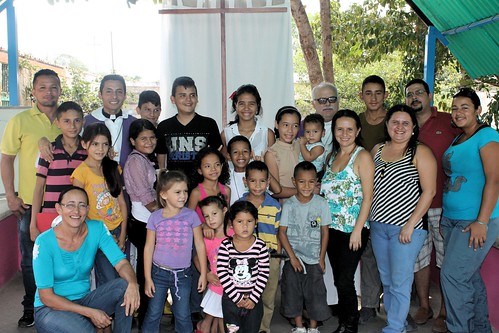The other reason that this of interest to the children is because so many of their relatives have fled Venezuela for neighboring countries and even other corners of the world. The United Nations refugee agency estimates that the number of refugees and migrants from Venezuela has surpassed 7 million globally, according to data from governments receiving them. People continue to leave Venezuela to escape violence, insecurity and threats as well as lack of food, medicine and essential services.See the Global Lutheran Outreach (GLO) Web site for details on the GLO campaign to send medicine to Venezuela.
We also took up this theme and how God can use evil for good with older children in our Sunday afternoon Bible class. The reading was from 2 Kings, chapter 5, the story of the prophet Elisha and Naaman the leper. There is a lot to talk about in that story, but for our your the important point was Naaman, a general in the king of Syria’s army and an otherwise successful man, learned of Elisha and the power of the God of Israel from a young Israelite who had not forgotten her faith, even though captured by the Syrians and made a slave in Naaman’s household. So the Lord not only watches over those who trust in Him, even if they are separated from family and homeland, but turn even the worst circumstances into opportunities to testify of His power and mercy in Jesus Christ. Praise be to God that we have been able to resume classes in the preschool, because other educational institutions have remain closed as teachers’unions demand a new collective bargaining contract that restores
social benefits and adjusts salaries to current living costs. The government has not adjusted the salaries of public-sector employees
since March of last year,
part of efforts to reduce spending and increase taxes which allowed
Venezuela to emerge from hyper-inflation. But
in the second half of last year demand for foreign currency
outstripped the weekly supply of dollars made available by the
central bank and the bolivar depreciated further. Meanwhile,
our
enrollment stands at 22 students, three have special needs. One is
autistic, one is hearing impaired and one is partially paralyzed. Luz
Maria’s daughter, Sarai, has her teaching degree in special
education, but these children need constant attention, which is
difficult for one teacher to provide, even with two teacher’s
aides. So, again thanks be to God, we
have gained an additional teacher, Maria Perez.
Praise be to God that we have been able to resume classes in the preschool, because other educational institutions have remain closed as teachers’unions demand a new collective bargaining contract that restores
social benefits and adjusts salaries to current living costs. The government has not adjusted the salaries of public-sector employees
since March of last year,
part of efforts to reduce spending and increase taxes which allowed
Venezuela to emerge from hyper-inflation. But
in the second half of last year demand for foreign currency
outstripped the weekly supply of dollars made available by the
central bank and the bolivar depreciated further. Meanwhile,
our
enrollment stands at 22 students, three have special needs. One is
autistic, one is hearing impaired and one is partially paralyzed. Luz
Maria’s daughter, Sarai, has her teaching degree in special
education, but these children need constant attention, which is
difficult for one teacher to provide, even with two teacher’s
aides. So, again thanks be to God, we
have gained an additional teacher, Maria Perez.
 New cycle of
deaconess training
New cycle of
deaconess training
Luz Maria once again will serve as mentor to women in another three-year round of deaconess formation. The program is offered by our national church’s Juan de Frias Theological Institute in partnership with Concordia El Reformador Seminary in the Dominican Republic. The training consists of both online study, in-person seminars and fieldwork assignments.
The office of deaconess is an auxiliary office of the church in which women may dedicate themselves to the material and spiritual needs of others in support of the pastoral office preaching and administration of the sacraments. The origin of the diaconal ministry can be traced to Acts 6:1-7, where the apostle delegate the distribution food to widows to “seven men of good repute, full of the Spirit and of wisdom” that they might dedicate themselves to “prayer and the ministry of the word”. This was originally a lay ministry and there is evidence in the New Testament that it was open to women as well as men. Several women are mentioned as holding prominent and responsible positions within the early church, such as Dorcas, Lydia and Priscilla. St. Paul refers to Phoebe of Cenchrea as a deacon (διάκονον) of the church in Romans 16:1. There is some debate as to whether “women” in 1 Timothy 3:11 refers to deaconesses or the wives of male deacons. The word is γυναῖκας (gynaikas), which may mean a woman of any age, whether a virgin, or married, or a widow. In favor of the interpretation that it refers to deaconesses is the fact that 1 Timothy 3:1-7 lists requisites for the pastoral office, but does not mention any duties of pastor’s wives.
 In
any event, the proceedings of the Council of Nicea in 325 AD deal
with deaconesses as a specific office
within the church. With the
development of a more complex hierarchy within the church, male
deacons came to be considered part of the ordained clergy and
deaconess as a distinct office had disappeared by the 12 Century. But
the work of deaconesses was
taken over by nuns. One of the most moving legacies of this
post-apostolic period in church history is the correspondence between
John Chrysostom, bishop of Constantinople at the turn of the fourth
and fifth centuries, and Olympias, his chief deaconess. His letters
from exile (long story) would begin in this fashion: “To my lady,
the most reverend and divinely favored deaconess Olympias, I John,
Bishop, send greeting in the Lord.”
In
any event, the proceedings of the Council of Nicea in 325 AD deal
with deaconesses as a specific office
within the church. With the
development of a more complex hierarchy within the church, male
deacons came to be considered part of the ordained clergy and
deaconess as a distinct office had disappeared by the 12 Century. But
the work of deaconesses was
taken over by nuns. One of the most moving legacies of this
post-apostolic period in church history is the correspondence between
John Chrysostom, bishop of Constantinople at the turn of the fourth
and fifth centuries, and Olympias, his chief deaconess. His letters
from exile (long story) would begin in this fashion: “To my lady,
the most reverend and divinely favored deaconess Olympias, I John,
Bishop, send greeting in the Lord.”
The restoration of the office of deaconess within the Lutheran church was begun in the early 19th Century by pastors Theodor Fliedner and Johann Konrad Wilhelm Loehe, who both established schools for deaconesses in Germany, and continues to this day.
Here is a translation of a prayer for deaconesses from our 1964 Spanish Lutheran hymnal, “Culto Cristiano”.
Oh God, Father of our Lord Jesus Christ, who in times past called consecrated women to serve you in your church: Bless all women who dedicate themselves to Christian service as deaconesses. Increase their knowledge of the Gospel, give them a sincere, true purpose, diligence in their work, and the beauty of life that Christ offers, so that through their work many souls may be blessed, and your name may be glorified. Through the same Jesus Christ, our Lord, who lives and reigns with you and with the Holy Spirit, always one God, forever and ever. Amen.







